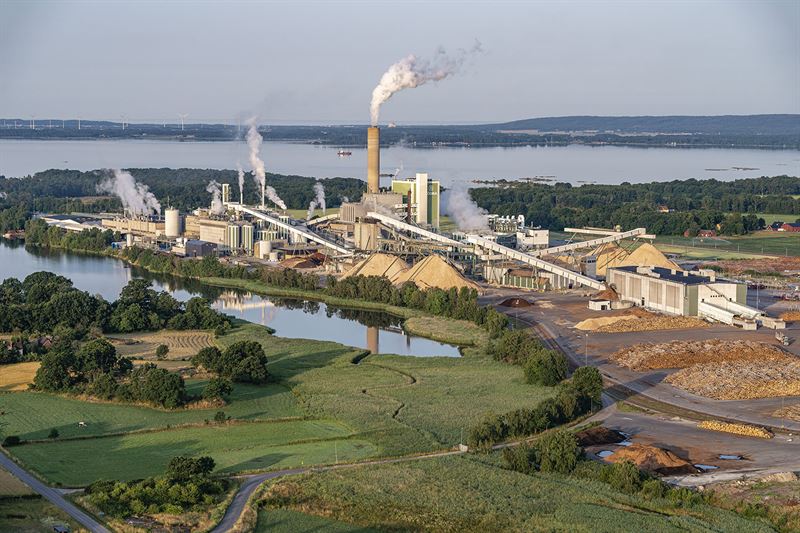Biggest ever EU LIFE textile funding to the recycling system OnceMore®
In its largest funding ever, EU LIFE has granted 10 million EURO for a project to scale up OnceMore®, an innovative, first-of-a-kind industrial-scale system for recycling of blended textile waste. The project is a collaboration between Swedish Forest industry group Södra and Austrian company Lenzing.

The EU-financed “EU LIFE 2022 Circular Economy and Quality of Life” grant is for the joint project: LIFE TREATS (Textile Recycling in Europe AT Scale). In this project Södra and Lenzing combine their decades of experience, knowledge and technology to further develop the unique OnceMore® process. Södra’s OnceMore® process brings real-world circularity to textiles, and Lenzing is a leading global provider of specialty fibers for the textile and nonwoven industries.
OnceMore®: an important solution for textile recycling of blended materials
Every year 5.8 million tons of textiles, or 11 kg per person, are wasted in the EU. And consumption is predicted to increase 60 percent by 2030 compared with today**.
“Today only 1 percent of the world’s textile waste is recycled, putting an enormous burden on the environment. With the help of this significant funding, Södra and Lenzing are ready to provide one of the main solutions in terms of chemical recycling and become the enabler for the circular textile economy,” said Åsa Degerman, Manager OnceMore® by Södra.
“As the first project of its kind at large scale, LIFE TREATS will open new circular business opportunities and increase the proportion of recycled fibers used in new clothing,” said Sonja Zak, Head of Textile Sourcing & Cooperations at Lenzing Group.
60,000 tons per year of recycled textile pulp
The LIFE TREATS project includes a scaling up of the OnceMore® process at Södra’s mill at Mörrum, Sweden, as well as the joint process development. The plant that will be built, will combine 50 percent recycled content with 50 percent renewable wood from sustainable family forestry in Sweden and will be capable of processing 50,000 tons per year of blended post-consumer textile waste, meaning different colours and materials, to produce 60,000 tons per year of textile pulp. Lenzing makes a decisive contribution here, especially with its know-how in the field of recycling.
The proposed solution will allow handling of a wide variety of complex post-consumer coloured textiles containing a mix of cotton, polyester and other components including elastane. The project will begin in Q3 2023 and continue for four years. LIFE is administered through the European Climate, Infrastructure and Environment Executive Agency (CINEA).
Significant contribution to the EU Circular Economy Action Plan
The project stands to make a significant contribution to the EU Circular Economy Action Plan by diverting large volumes of coloured, blended textile waste from downcycling, landfill or incineration. The project involves stakeholders throughout the textile circular value chain, from raw material, through manufacturing, distribution, collection and recycling.
“Addressing the textile waste problem requires a systematic approach alongside industrial-scale technological solutions. The LIFE TREATS project therefore seeks an integrated approach to enable real change and reduce the textile industry’s adverse environmental and social effects in the EU and beyond,” said Zak.
“While highly-developed systems exist within Europe for collection and sorting of used textiles, these are mainly dedicated to the second-hand business. Upcoming legislation such as the EU’s Waste Framework Directive, Extended User Responsibility, the decline in second-hand export markets and an observed reduction in the quality of collected textiles, point to significant changes in the textile-waste handling environment,” said Degerman.
Södra and Lenzing acknowledge and commit to the waste hierarchy. Their sourcing will only focus on textiles that cannot be reused in any other way and therefore aim to give these valuable fiber resources a high-quality second life and prevent downcycling, landfill or incineration.
*EU 2019
**Regeringskansliet (Swedish Government) KN2023/03051 Promemoria May 2023
For additional information, please contact:
Åsa Degerman, Manager OnceMore®
Phone: +46 703 87 03 42
Email: asa.degerman@sodra.com
Dominic Köfner, Vice President Corporate Communications & Public Affairs, Lenzing AG, Austria
Phone: ++4 7672 701 2743
Email: media@lenzing.com
Södra’s press room
Phone: +46 470-890 90
Email: press@sodra.com
_________________________________________________________________________________
About Södra
Södra was founded in 1938 on the idea that we are stronger together. We are now the largest forest-owner association in Sweden, with 52,000 family forest owners as members. Together, Södra’s members own a world-leading industry that processes forest raw material into renewable products such as pulp, timber, building systems, liquid bioproducts and energy. Rooted in the forest, we grow the future.
About Lenzing
The Lenzing Group stands for ecologically responsible production of specialty fibers made from the renewable raw material, wood. As an innovation leader, Lenzing is a partner of global textile and nonwoven manufacturers and drives many new technological developments. Its high-quality fibers form the basis for a variety of textile applications ranging from elegant clothing to versatile denim and high-performance sports clothing.
Disclaimer LIFE TREATS
LIFE22-ENV-SE-TREATS – 101113614 is co-funded by the European Union. Views and opinions expressed are however those of the author(s) only and do not necessarily reflect those of the European Union or CINEA. Neither the European Union nor the granting authority can be held responsible for them.
Show more press releases for topic
Subjects: innovation, skogsägare, IE, Research, Södra, massa, global, PULP, GB, Om Södra, OnceMore, Södra Innovation, forest owner, Åsa Degerman
Press Release
Subjects: innovation, skogsägare, IE, Research, Södra, massa, global, PULP, GB, Om Södra, OnceMore, Södra Innovation, forest owner, Åsa Degerman
Published:
